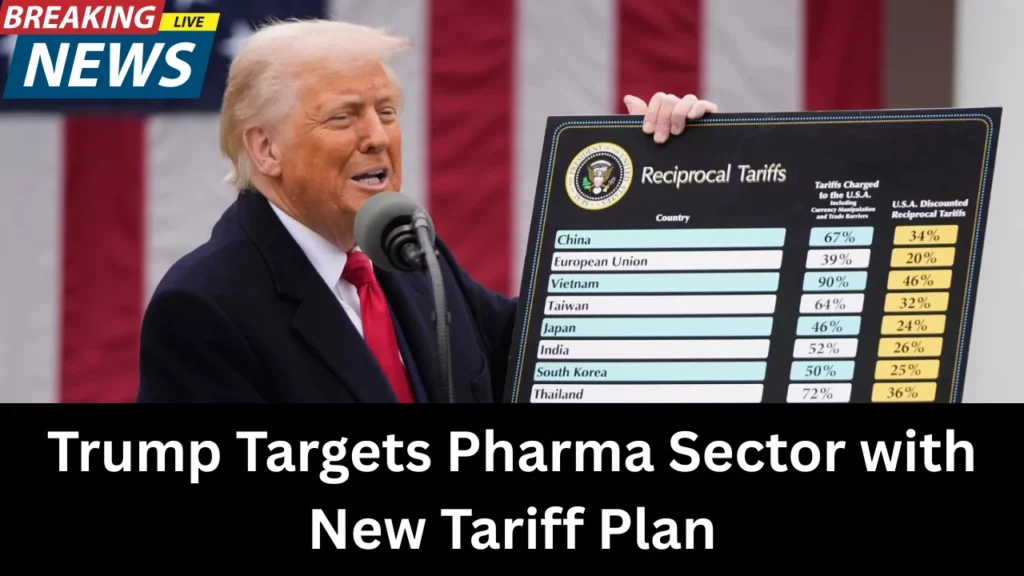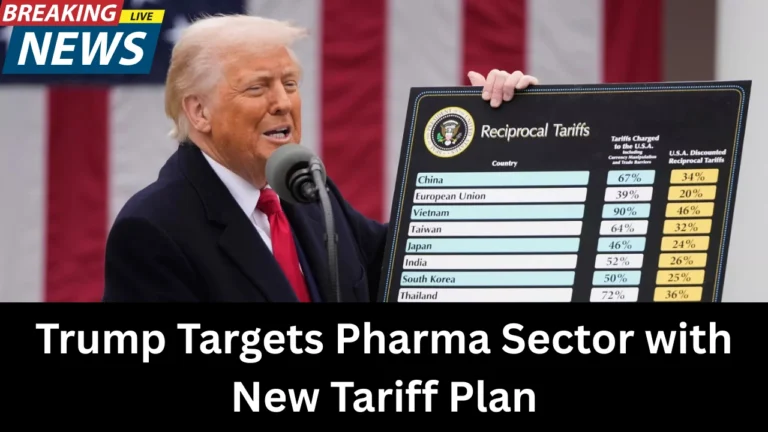Trump Targets Pharma Sector with New Tariff Plan : In a bold move that has already rattled global markets, former U.S. President Donald Trump announced on Tuesday that the United States is preparing to impose major new tariffs on pharmaceutical imports. The announcement was made during a National Republican Congressional Committee (NRCC) event, where Trump emphasized that the sweeping measure is aimed at reshoring drug manufacturing and reducing dependence on foreign nations particularly China and India for essential medicines.

The proposal, first reported by Reuters, marks the latest escalation in Trump’s protectionist trade agenda, and comes amid a volatile week for global stock markets, which have been responding sharply to fears of a widening tariff war.
"Solid Opportunities in #Pharma sector loading"
— SAU₹ABH SHUKLA (@SBK_analysis) April 9, 2025
start finalizing your picks
🚨 BREAKING: TARIFFS ON #PHARMA COMING “WE ARE GOING TO TARIFF OUR PHARMACEUTICALS AND ONCE WE DO THAT THEY ARE GOING TO COME RUSHING BACK INTO OUR COUNTRY.” –@POTUS#tariffs #Trump #TrumpTarrifs https://t.co/NH3TCeFhIg pic.twitter.com/2Zts0Fizqz
A “Major” Tariff on Pharma Imports
“We’re going to bring our pharmaceutical manufacturing back home. No more relying on adversaries for lifesaving drugs,” Trump declared during his remarks on April 2.
The statement aligns with Trump’s broader “America First” economic strategy and follows his April 2 announcement of increased tariffs on a wide range of imported goods, including automobiles, electronics, and now, pharmaceuticals.
While details remain scarce, sources close to the Trump camp suggest the tariff rate on pharmaceutical imports could be as high as 20% to 30%, depending on the product category. The move is expected to target a range of active pharmaceutical ingredients (APIs), finished drugs, and medical supplies that are predominantly produced overseas.
Why Pharmaceuticals?
The pharmaceutical sector has long been seen as strategically sensitive. The COVID-19 pandemic exposed vulnerabilities in the global supply chain, revealing that the U.S. depends heavily on China and India for raw materials and generic drug production. According to the U.S. Food and Drug Administration (FDA):
- Nearly 80% of the active pharmaceutical ingredients (APIs) used in U.S. drugs are made abroad.
- India is the world’s largest supplier of generic medicines, accounting for 20% of global exports.
Trump, who has often criticized the offshoring of critical manufacturing, is now leveraging that national concern into a campaign promise to restore pharmaceutical independence.
Market Reactions: Pharma Stocks Dip, Volatility Surges
News of the impending tariffs had an immediate effect on the markets:
- S&P 500 Pharmaceuticals Index dropped by 2.3% within hours of the announcement.
- Shares of major drug importers and generic manufacturers—Teva Pharmaceuticals, Dr. Reddy’s Laboratories, and Sun Pharma—took a hit.
- Meanwhile, U.S.-based drug manufacturers like Pfizer and Moderna saw minor gains on speculation that domestic producers could benefit from the new trade barrier.
The broader market also reacted with caution, as fears of retaliatory tariffs from trading partners mounted. Investors are concerned that the pharma tariffs could provoke a new front in the global trade war, especially with countries like India, which are key suppliers to the U.S. healthcare system.
Industry Response: Applause and Alarm
The response from the pharmaceutical industry and healthcare experts has been mixed.
Supporters argue:
- The tariffs will encourage domestic drug production, creating American jobs.
- It enhances national security by reducing reliance on foreign countries.
- Reshoring manufacturing could result in better regulatory oversight and quality control.
“This is a necessary move to ensure our critical drug supply is never in the hands of adversaries,” said Peter Navarro, former White House Trade Advisor and an advocate of reshoring pharma manufacturing.
Critics warn:
- Tariffs could drive up drug prices for consumers, making essential medications less affordable.
- Supply chain disruptions could lead to shortages, especially for generic drugs.
- Developing infrastructure for large-scale pharma production in the U.S. could take years and billions in investment.
“Tariffs on essential drugs are not the answer. We risk making healthcare more expensive at a time when Americans are already struggling with inflation,” said Stephen Ubl, President and CEO of PhRMA, the leading pharmaceutical lobbying group.
Global Implications: India, China Likely to Retaliate
India and China, the two largest exporters of pharmaceutical products to the U.S., are closely watching Washington’s next move.
- India’s Ministry of Commerce issued a statement warning that any disruption in the global pharma supply chain could have “serious humanitarian consequences.”
- China’s Foreign Ministry called the proposed tariffs “economic coercion” and hinted at countermeasures.
These developments come amid already strained trade relations between the U.S. and its partners. Trump’s hardline stance on tariffs has drawn concern from global health organizations, which fear that politicizing pharmaceutical trade could complicate access to life-saving medications worldwide.
Is America Ready to Manufacture Its Own Drugs?
While the idea of bringing pharmaceutical manufacturing back to the U.S. has broad public support, the reality on the ground poses challenges:
- Infrastructure: Building FDA-compliant factories requires time, skilled labor, and regulatory approvals.
- Cost: Domestic drug production is significantly more expensive due to higher wages and compliance costs.
- Supply Chain Complexity: Many drugs rely on a web of international suppliers for raw materials and components.
However, the Inflation Reduction Act and the CHIPS and Science Act have laid some groundwork by supporting domestic production in other industries, and similar incentives could be extended to pharmaceuticals under a Trump administration.
What Comes Next?
If Trump proceeds with the plan, the Office of the U.S. Trade Representative (USTR) would likely initiate a formal investigation, followed by a notice and comment period before tariffs are finalized. This process could take several months, pushing implementation closer to the 2024 presidential election cycle, where trade and health security are expected to be major talking points.
The move could also reignite debates in Congress, where some members have already expressed concern about using tariffs as a healthcare policy tool.
FAQ’s
What did Donald Trump announce about pharmaceutical tariffs?
A: On April 2, 2025, former President Donald Trump announced plans to impose major tariffs on pharmaceutical imports, particularly targeting foreign-made drugs and medical supplies. The move aims to encourage domestic manufacturing of essential medications.
Why is Trump targeting the pharmaceutical sector?
Trump stated that the goal is to reduce U.S. reliance on foreign countries—especially China and India—for life-saving drugs and to boost domestic drug manufacturing. He believes this will enhance national security and create American jobs.
What products could be affected by the new tariffs?
While exact details are pending, the tariffs are likely to impact active pharmaceutical ingredients (APIs), generic drugs, and medical equipment that are imported into the U.S.
How much are the proposed tariffs on pharmaceutical imports?
The proposed tariff rates have not been officially disclosed, but reports suggest they could range from 20% to 30% depending on the product category.

